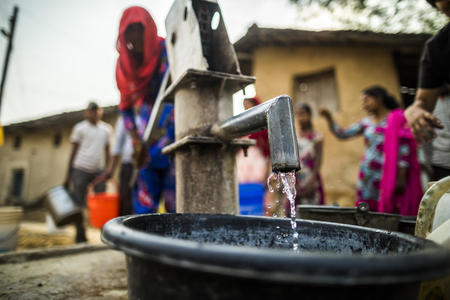Community-led solutions are key to tackling climate change in India

Climate change is exacerbating problems of poor water management, threatening already scarce resources. As global temperatures rise, the impact on people living in water-stressed regions will continue to increase. Avinash Kumar and Virginia Newton-Lewis look at how we are building resilient water services in India by putting community involvement at the heart of projects.
By 2030, India’s demand for water will reach twice the available supply. Today, with almost 70% of its water contaminated, India's water quality is the third worst in the world, according to the water quality index.1 People need more water, pollution means there is less of it and climate change is further complicating everything. We are facing a public health crisis.
This year saw the much-needed monsoon rains arrive weeks late, following a searing heatwave that killed at least 137 people. Chennai, India's sixth-largest city, hit the headlines for running dry, exhausting the water supply for most of its citizens. The severe heatwave of 2017 fatefully followed a historic flood in 2015 that devastated most of the city and left many of its inhabitants homeless.
Climate change is exacerbating problems of poor water management
This crisis has not come out of nowhere. The pressure on water supply is due to decades of poor water management combined with over-extraction of groundwater. Existing problems are now exacerbated by climate change.
Technological innovations have dramatically increased the pace of groundwater withdrawal, but there are no laws to regulate it. This has encouraged unsustainable agricultural practices such as water-intensive commercial cropping in arid zones. The changes in rainfall patterns have merely revealed this slowly developing crisis.
This year’s heatwave might be an indicator of what could become the new normal. Indians have long lived with unpredictable weather, but they will soon have to adapt to increasingly severe conditions as a matter of course.
India is not alone. Temperatures around the globe are rising. July 2019 was the hottest month on record. The increasing unpredictability of the arrival and duration of droughts and floods, together with incremental yet unstoppable rises in sea level, are among the clearest indicators of global warming. And they particularly impact on the poorest and most marginalised people – those without reliable access to water, sanitation and hygiene (WASH). Action is urgently required to help people already dealing with these consequences of climate change, and those who soon will be.
India’s Government is beginning to respond
The Modi Government, which started its second term in May, is drawing up a legislative package for water sector reforms, including a model law aimed at managing what has become one of the scarcest and most precious resources – water. There are also plans for a second model law specifying provisions for re-using and recycling water.
Simultaneously, the Government has launched the Jal Shakti Abhiyan – a campaign for water conservation and water security through good management. Groundwater experts and scientists will work together with state and district officials in the most water-stressed districts. The focus will be on rejuvenation of water bodies, reuse of treated waste water, water conservation and rainwater harvesting, bore-well recharge structures, watershed development and nature-based solutions such as planting trees.
WaterAid is working with communities to build resilient water services
Our work in India has focused on building mass awareness around the essential need for water conservation and the value of combining traditional knowledge with new innovations.
However, there are no one-size-fits-all solutions. Every intervention must be backed up by specific geological evidence that it will be resilient to the effects of climate change, and sustainable in the long term.
- Across Banda district in the state of Uttar Pradesh, in March this year we began a collective district-wide campaign on groundwater recharge and conservation called Bhujal Badhao, Payjal Bachao (‘Increase groundwater, save drinking water’). More than 35,000 people took part in a community-based platform called Jal Choupal on water budgeting and groundwater assessment. Through the platform, communities, activists, government officials, researchers and civil society groups can collectively reach solutions to water problems.
- More than 2,000 broken hand pumps have been repaired and 260 dysfunctional wells restored. Approximately 2,500 small wells and ponds were created to capture the rains while raising and recharging the groundwater level, and 2,500 trenches were dug to help soil and water conservation. The second phase of the campaign is now focusing on restoring surface water bodies.
- In Kanker district of Chhattisgarh state, a district-wide rainwater harvesting campaign to build more than 5,000 structures is underway. With our local partners, we have supported the planning, capacity building and skills training required to use the software for remote monitoring.
- In the south, across districts in Kerala (Palakkad), Karnataka (Nelamangala) and Andhra Pradesh (Sri City), our focus is to help communities construct resilient water-related infrastructure such as mini-piped water supply and rainwater harvesting systems. The aim is also to generate a strong feeling of local institutional ownership of the projects through community-based village water and sanitation committees, water user groups and school management committees. This way communities can own and manage these structures with some basic technical knowledge.
During the 2018 monsoon, these projects harvested more than 20 million litres of rainwater. We shall soon see the importance of capturing this year’s rains.
Climate resilience must be part of every project
With every project, it is clear that specific problems require specific solutions. But what they all have in common is an emphasis on community-led work and a feeling of ownership of the adaptations.
It is imperative that vulnerable people living on the frontier of climate change take the initiative to persuade governments to respond to the worsening water crisis. Facility resilience goes hand-in-hand with sustainability of resource management – the key to which is engagement and ownership by the communities relying on those services.
The local governance institutions in charge of the management of WASH infrastructure must encourage the community to actively participate in planning, delivery and monitoring of these resources.
In preparing for a future in which climate change will detrimentally impact on increasingly stressed water resources, sustainability and resilience must be at the heart of all work to improve WASH services. And, therefore, so must community involvement.
We will continue to demonstrate the successes of and lessons from community-led approaches. Projects like these, combined with the significant financial resources and infrastructure the state is promising, inspire a positive outlook for greater resilience in parched India. With the demand for water growing so rapidly, we cannot make that outlook a reality soon enough.
Avinash Kumar is Director, Programmes and Policy at WaterAid India. Follow him at @Avinashkoomar. Virginia Newton-Lewis is Senior Policy Analyst – Water Security at WaterAid UK. Follow her at @drvlnl.
1 Government of India. Composite water management index (large PDF).





